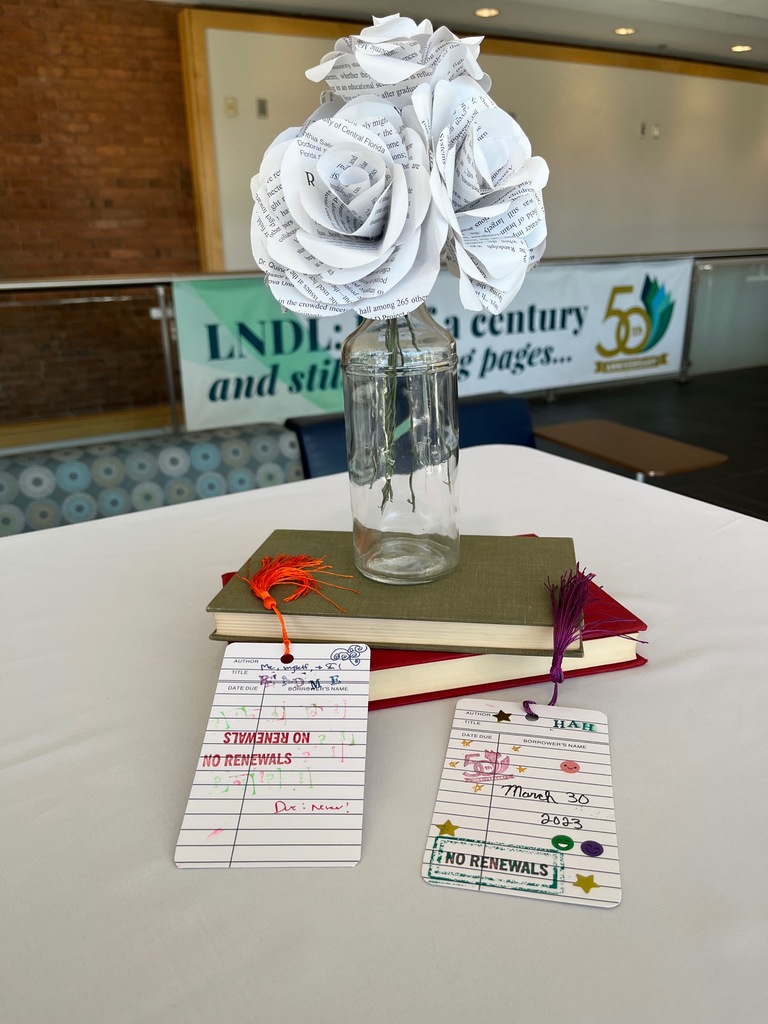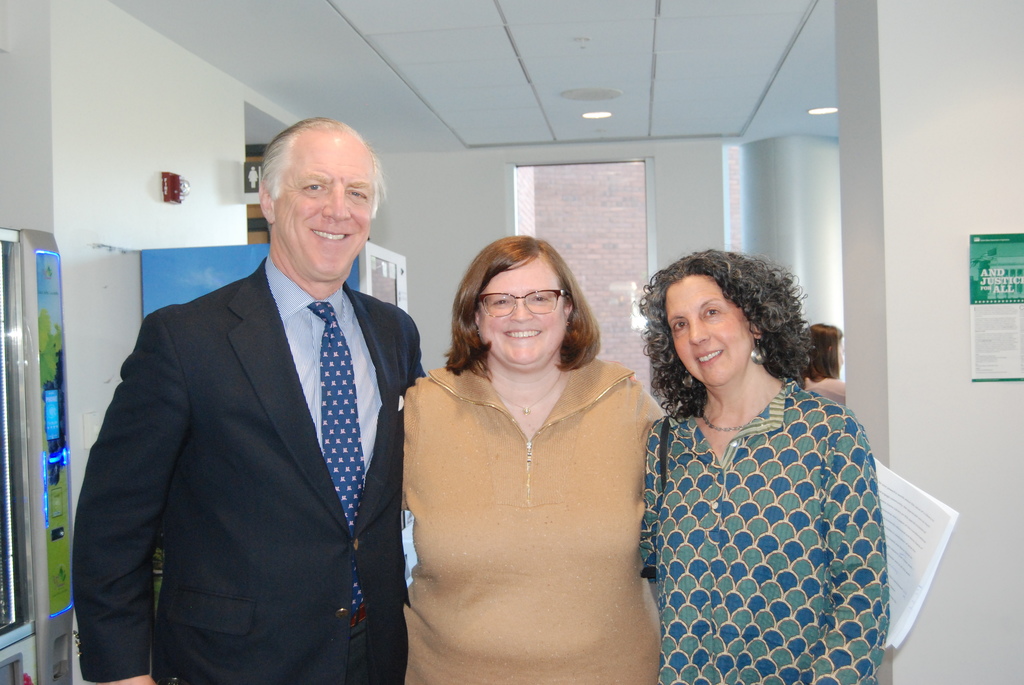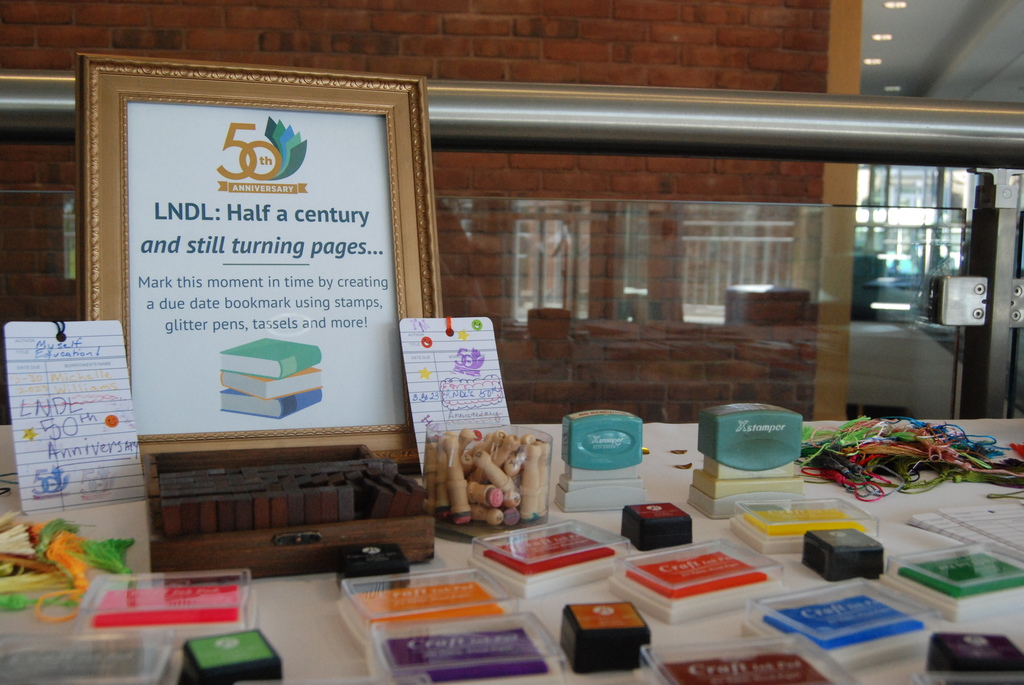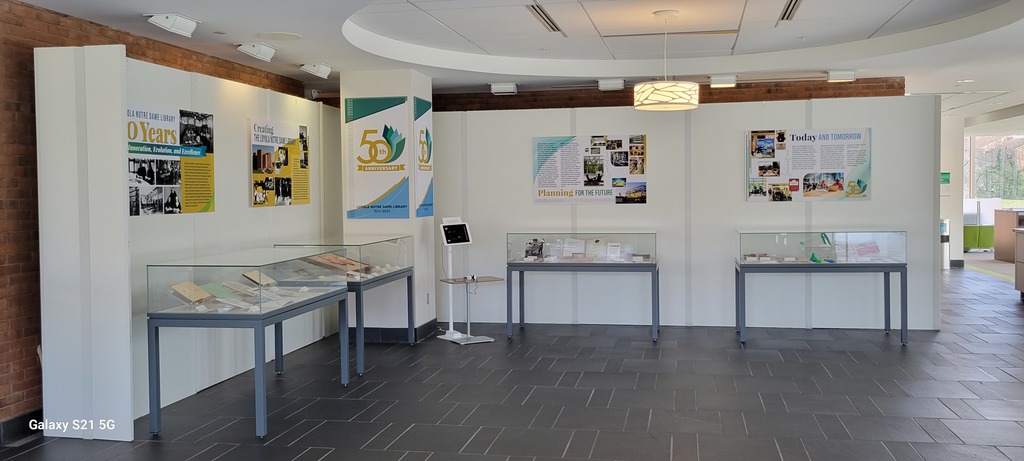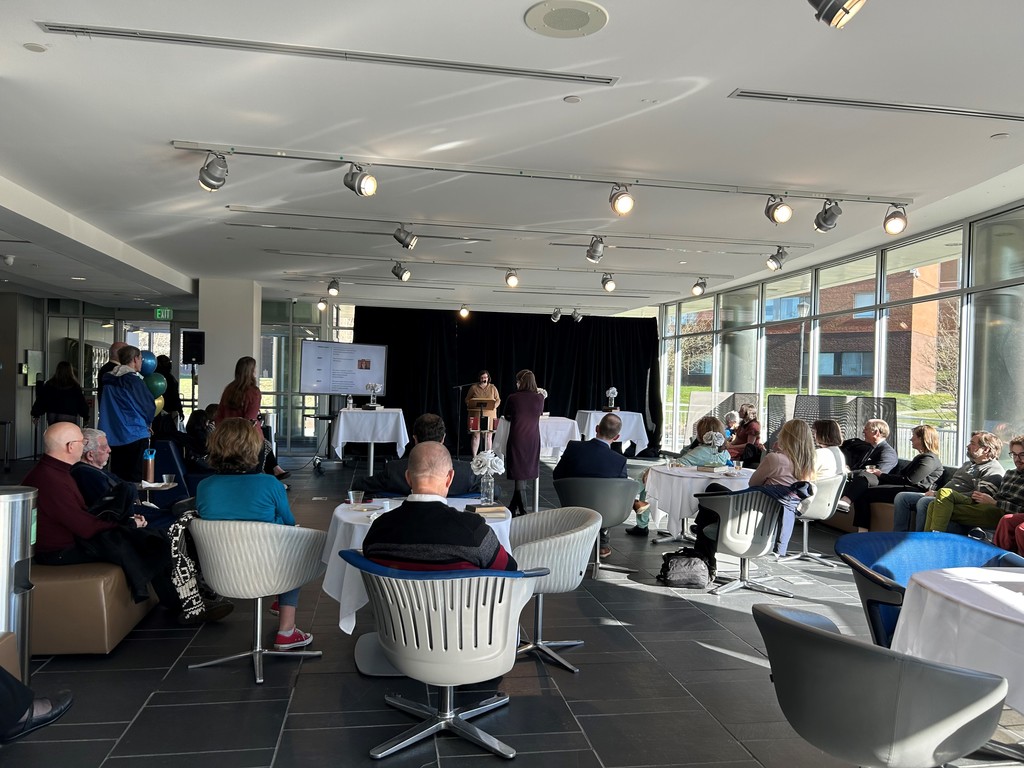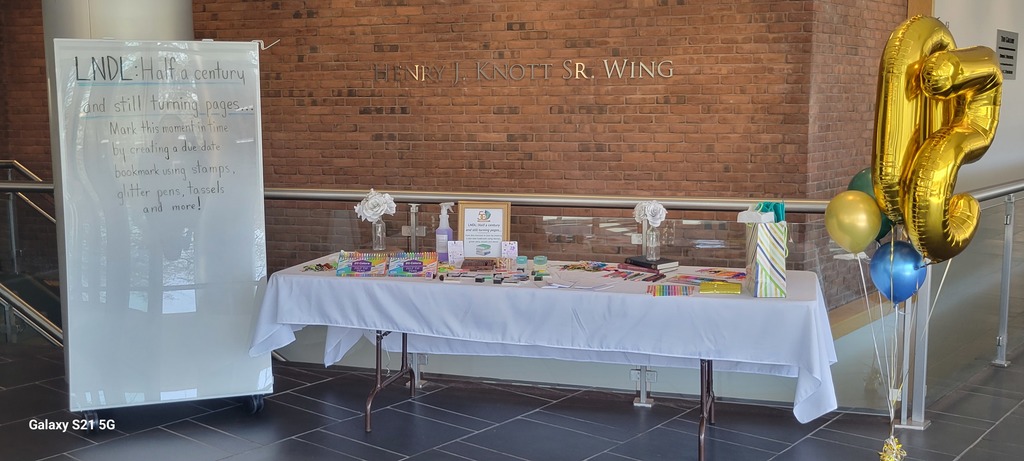The Loyola Notre Dame Library celebrated its 50th anniversary on March 30th. The celebration set the stage for a year of special events highlighting achievements of the joint Loyola University Maryland and Notre Dame of Maryland University library. Poet and author Lia Purpura spoke about her deep appreciation of libraries and gave event attendees an intimate view of LNDL – a place she frequented during her over 20 years of teaching at Loyola.
The Library invites students, faculty, staff, and community patrons to view the physical exhibit in the Ferguson Gallery, as well as an online timeline of the library’s history.
You can also read Lia Purpura’s speech from the day of the event here below:
On the Occasion of Loyola Notre Dame Library’s 50th Anniversary
Lia Purpura
I’m honored to speak with you all today – and to be celebrating the library at 50. Asking a writer to speak about libraries, is like asking her to talk about her favorite food, first home, and most beloved friend all in one breath…So I’m going to turn this to the genre of love letter and jump right in. Libraries are universes, sanctuaries, and, along with the great Argentinean writer Jorge Luis Borges, I’d say, they’re infinite spaces. They’re also houses for stories in so many ways. Having been with us for 50 years, the Loyola Notre Dame Library is, itself the site of so many stories. I’ve collected a few from the peoples on this celebratory occasion to get us started.
First from an esteemed Loyola professor:
“I recall the years when the décor was burnt orange carpet and turd-brown plastic lounge chairs. When John McGinty came in as the new director in 2001 and met with the faculty, he said one of his first acts would be to get rid of the carpet and chairs. The faculty burst into spontaneous applause.”
From a Baltimore-born-and-raised realtor:
I remember when this library was built. In 1973, I was 14 years old and
loved to ride my bicycle. through the winding path from Loyola
College to College of Notre Dame …In High School, I remember going to the library to research papers and being fascinated by the sheer volume of material – and how grown up
I felt going to a college library. It was easy to get lost in my curiosity about
psychology, religious and spiritual topics…Being raised in an Irish-Catholic family of seven, the
Loyola-Notre Dame library became a place of refuge where I could escape and find some quiet space and time to just read and think and get some direction about where I wanted my life to go.
When I taught at Loyola, I was, apparently, one of the top three interlibrary loan requestors. Who knew such rankings existed? And since librarians are among the sanest and most discreet people ever, my inside source wouldn’t reveal my competitors or my exact ranking, but the fact that such stats were kept at all and that I was right up there still thrills me.
And this quick story, tentatively titled “how browsing changed my life” – around 10 years ago now, I was here waiting for a ride (as usual I’d checked out more books than I could carry even a few blocks) and while browsing the new bookshelves, found a stunning collection of photos by the internationally known photographer Kate Breakey. A few days later I wrote her a fan letter. She read my work, responded and an ongoing collaboration was born – I wrote the introductory essay for her upcoming exhibition and book, and she lent her photo to the cover of my latest collection of poems.
I’ve loved libraries from the moment I could read and started working in my home town library at 14, shelving books, and continued all through college and then again when I first moved to Baltimore (where I typed up actual card catalog cards at the Baltimore Museum of Art as fast as possible so I could sit in the storage room and appear to be unpacking and organizing when in fact I busy reading Gertrude Stein’s actual margin notes in the actual books she donated)
As with any deep and abiding love story, there are complexities to wrangle with if you’re to sustain the connection over many years. I admit, the very feel of the library shifted for me, in unexpected and disturbing ways – about 15 years ago. I remember the shock of this sensation clearly – I was walking past the L/ND library and looking up into the brightly lit stacks from Winston Ave and quite suddenly the shelves of books seemed to recede, as if they were being pulled into a distant vanishing point… The library felt, for the very first time– puny (only these few books?), random (why this book and not another) and each small, static object seemed to be taking up space for endless others.
Of course, it was the internet effect in full force. The everything, everywhere, all at once feel.
I recognized, too, that the particular vastness that made the library feel small is not at all human-sized or human -centered. The vastness is an onslaught, a sense of unorganized overwhelm and speed and its present every time I scroll and surf around, see reviews and ads and posts and realize I still haven’t read Elena Ferrante, and I’m not as up on the wonders of mycelium, or the phenomena of sneaker culture as I should be. BUT! Libraries know exactly what they’re up against — and, in response, are continually shape-shifting, reaching out – and ordering the tsunami of information out there. Libraries are in the actual business of creating human-scale systems of knowledge delivery, they’re in the business of figuring out how to identify and address community needs and respond to actual individuals. And, astonishingly, today, in 2023, libraries and librarians are also front-line fighters, defending our freedom to access our shared history, and the full range of our most basic rights.
As a writer, I work alongside the puny feeling – always. … my own little poems and essays lost in the sea of others, my work trying, in its puny way to look into the eyes of Big Issues and Urgencies and yes, the wonders of lichen. I feel you, libraries. Its constant, that need to regenerate one’s stance in the face of excess, instability, acceleration — the forces that so deftly urge us to “sacrifice a precious and defining way of being alive” as a writer friend of my once said.
Libraries though, are built to honor deep time, built to house, and support the informing patterns we seek, wrangle with, get lost in, carry with us, learn from, and write into. Libraries behave variously and with great imagination: they’re sanctuaries, support systems, community gathering spaces, active contemplative spaces, places of safety and connection. Consider Loyola/Notre Dame’s pop-up classes where folks can learn anything from zine making to bread baking; or visit the Maker’s Space and take up music recording or photography or engage with any number of digital scholarship projects or service learning projects that venture beyond the walls of the classroom. The Pratt employs full time social workers, and offers a variety of services, including expungement clinics and groups for folks battling substance abuse disorders.
I love actual books and won’t ever give them up. I don’t read on devices. I need to hold a book in hand, sniff it, listen to the shush of pages turning… (in case you’re in need, there are YouTubes out there featuring classic library sounds: the crackle of hardbound/cellophaned book being opened, the riffling of cards in an old card catalog, the rubber date-stamp stamping its ink pad – it’s a real thing!). I’ve shed the feeling of books-as- puny (that sensation required working through, like all the issues writers have to work through, all the time, in order to keep going). And, given their transformative powers, I most certainly do not feel that libraries are puny. Libraries are sites of chance encounters as well as spaces of seeking… which is exactly the combination of mystery and intention that defines any artist’s pursuit. Both libraries and the arts at large are sustained by the same energies – -part contemplative and inwardly organized and part civic and outwardly reaching. The mingling of vital creative forces – curiosity, imagination, facts, history, community among them – make up a common ecosystem.
I recently reread Borges’s wild story the Library of Babel – there’s way too much to say about it but here’s a brief excerpt for today: the story’s narrator talks about the sense of the chaos of information, stories, and mystery that’s always been at the heart of the library; the horror of censorship – that “senseless loss of millions of volumes” to the censors’/dictators “hygienic ascetic rage”; the existential fear writers feel when the “certainty that everything has already been written annuls us or renders us phantasmal.” As noted, these perceptions and concerns are utterly contemporary ones for writers, readers, and to be clear, for citizens trying to navigate our own infinities, the tangle of endless date, and volatile, collective politics. But Borges’ narrator lands on this note: “I am perhaps mislead by old age or fear, but I suspect that the human species … teeters at the verge of extinction, and yet that the Library – enlightened, solitary, infinite, perfectly unmoving, armed with precious volumes, pointless, incorruptible, and secret – will endure.”
The word in that amazing description I lingered on was “unmoving” – I believe he means it as “solid and reliable and unassailable.” What’s perfectly unmoving about libraries is their implicit and absolute care for the word, and a belief in free access to knowledge. And as long as that’s the unmoving stance, libraries are infinitely enduring sites.
One last image – one that changed as my vision of this space shifted with the moment. We often walk our dog to the library at night. I’ve always thought, in the surrounding dark, that it resembled a ship at sea moving through the calm waters surrounding it. Now though, the image is far more intimate and animated: the library at night looks to me like a heart, lit from within, all the chambers visible, us-all circulating through its arteries and veins, dropping off, picking up, taking in, passing along, activating together the whole body of the world with our own small selves, carrying off what what we need, and returning sustained.
So, with gratitude and love and most Sincerely, here’s to the Loyola. Notre Dame Library’s next 50 years.
